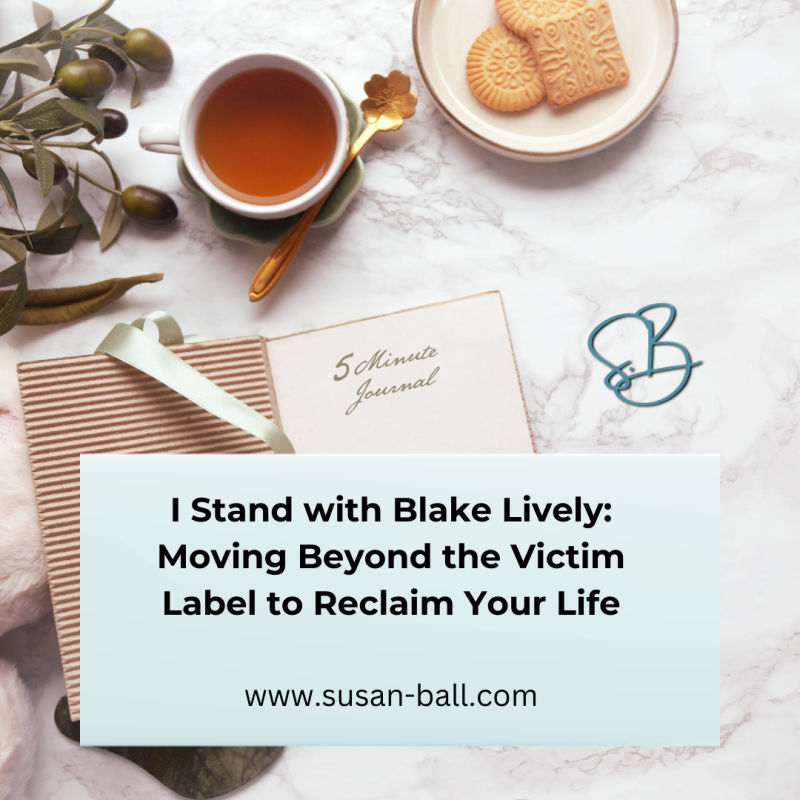Blake Lively's statement, "You are so much more than just a survivor or just a victim. And what someone has done to you doesn't define you. You define you," captures a powerful truth for women who have experienced domestic violence and are ready to step into their new chapter. While the trauma you have endured is significant and life-altering, it does not have to be the defining feature of your identity. Moving beyond the label of "victim" is crucial for women who want to reclaim their lives and create a future they love.
There has been controversy about what Blake Lively said and criticism that she lacked lived experience. I disagree with the crticism and stand firmly with her statement.

The Weight of the "Victim" Label
The term "victim" can carry a heavy burden. It often conjures images of helplessness, weakness, and defeat. For many women, being identified primarily as a victim of domestic violence can feel like a shackle, keeping them tied to their past and the trauma they experienced. While acknowledging and processing this trauma is an essential part of healing, it is not the end of the journey. It's only the beginning.
Women who have lived through domestic violence are not just survivors; they are resilient, resourceful, and capable of transformation. However, the victim label can sometimes overshadow these qualities, making it difficult for you to see yourself as anything other than what you endured. This is why it is so important for you to move past this definition and embrace a more empowering identity.
The Power of Self-Definition
Defining yourself is about reclaiming the narrative of your life and deciding who you want to be and what you want to do. Self-discovery begins when you choose to define yourself in a new way. Once you choose you, you have given yourself the gift of discovery and the power to write a new chapter about you and for you. Let's face it, domestic violence takes away our voice and identity. Leaving is a powerful first step in choosing you.
Moving beyond the victim label allows you to explore who you are outside of your past experiences. It opens up a world of possibilities for personal growth, healing, and self-discovery. When you define yourself on your terms, you create a life that reflects your true desires, rather than one shaped by the trauma you endured. You have the opportunity to explore your wants, needs, and desires and to get curious about what you want more of in your life and then set out to make it happen.
Building a New Unapologetic Life
The journey to building a new life is not easy, but it is possible and worth the effort. It requires courage, determination, and a willingness to let go of the past. This means setting new goals, pursuing new interests, and surrounding yourself with supportive people who uplift and empower you.
Creating a life you love involves more than just moving on from the past; it means actively shaping a future that brings joy, fulfillment, and peace. This might include pursuing education or career opportunities, developing new hobbies, or engaging in self-care practices that nurture the body, mind, and spirit. It also involves setting boundaries and learning to advocate for yourself. Your new unapologetic life ensures that your future is free from the patterns of abuse that marked the past. And that's a good thing!
Blake Lively's words are a powerful reminder that women who have experienced domestic violence are so much more than what happened to them. You are capable of defining yourself and creating a life you love, free from the constraints of the victim label. By embracing your power to choose who you want to be, you can transform your life, moving from a place of survival to one of unapologetically living. The journey may be challenging, but it is also filled with the promise of new beginnings and the joy of self-discovery and creation.
Journal Prompts to Move Beyond the Victim Label
What qualities and strengths have I discovered in myself through my journey, and how can I use them to shape the life I want to create?
If I were to define myself on my own terms, without any labels from my past, who would I be and what would I prioritize in my life?
What dreams or goals have I set aside because of my past, and how can I begin to pursue them now with renewed confidence?
How can I practice self-compassion and self-care as I move beyond the victim label and into a new chapter of my life?
What does a life I truly love look like, and what steps can I take today to start building that life?
For a deeper dive into this topic, be sure to watch my accompanying video on YouTube here.
Get my BEST healing resources delivered to your inbox. Join my newsletter list and get my favourite content regularly. No risk - you can unsubscribe anytime. Link to join - https://sendfox.com/susanball

Add comment
Comments